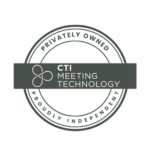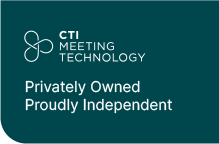Traditionally, events were executed based on experience and intuition. Organizers now have a much more reliable tool at their disposal: data. Just as chefs experiment with new ingredients and techniques to find the perfect recipe, organizers must analyze which areas of past events worked and which ones need further improvement for future conferences.
Forget about long lists of unorganized data and spreadsheets. The introduction of event technology has revolutionized how we collect and analyze data, making it easier than ever. Organizers can easily see which sessions were the most popular, which topics gathered the most attendees, or which interactivity tools the audience preferred. Then, they can use this information to tailor their events to attendee preferences, creating the recipe for success.
While it is true that technology has simplified the way we get data, it is beneficial to identify which information is relevant for organizers and not get lost in endless data. Keep reading to find out about the key metrics you need to ensure the success of your events:
Key Metrics for Event Success
First of all, start with the “ingredients” you need. That is, the key performance indicators (KPIs) that will guide your event success. Tracking attendance, engagement levels, and participant satisfaction are crucial metrics that can provide valuable insights into figuring out how effective your event strategy is.
Get specific with your goals and design an action plan for each one based on data-driven insights. For instance, if there is a trend of foreign attendees at your events, consider streaming the event and offering on-demand content afterward to increase accessibility. This way, you can increase the number of attendees and track their behavior more precisely.
Ensure your software provider offers detailed analytics according to the KPIs you want to monitor.
Data Collection Methods
Technology is a perfect aid to getting quantitative data. Software is constantly improving – and now with AI, we can even track user emotions and behavior when navigating a page or watching a video. However, communicating with participants and asking for their feedback is still crucial.
Two reasons why: you will get first-hand information, and participants love to feel heard. Send out surveys and feedback forms after every session to get an idea of the overall sentiment and preferred topics. Do it as well at the end of the event, and try to be as specific as possible with your questions. Even small things like the venue facilities can make a difference in the attendee experience. Make sure your participants get the opportunity to voice their concerns and thoughts.
These techniques might seem simple, but don’t skip them! They provide a wealth of information and enable organizers to make better-informed decisions.
Comparison with Past Events
But perhaps the most reliable – and accessible – data is those of past events. Analyze historical data to identify successes and areas of improvement. Organizers should always take away a lesson from past events, no matter how successful they were.
This data is crucial – but remember its context. For example, the insights gathered from events hosted before and after the 2020 pandemic can be vastly different. Travel restrictions and sanitary measures impacted the event industry heavily; it seems the worst has passed, but the events industry will feel the impact of the pandemic for years to come. Organizers should stay informed about international news and regulations that may directly affect their event.
Analyzing Attendee Behavior
Analyzing attendee movement, session attendance, and engagement patterns offers a window into understanding what resonates with event participants. Now, go further and ask yourself: why is this session more popular than others?
Maybe the topic is innovative and novel, or it is being hosted by a renowned speaker. Perhaps the time slot is perfect, not overlapping with any other sessions. Or, maybe interactivity tools keep attendees engaged and focused until the end.
Now, you can combine the insights from the event software analytics and attendee feedback to find the answers to these questions. By uncovering these insights, organizers can tailor future events to match audience preferences and increase engagement.
Utilizing Demographic and Psychographic Data
Unfortunately, it is impossible to tailor the event to each one of your participants. However, organizers can use segmentation to divide the total attendees into groups and gauge their interests better.
Collect demographic information during registration and analyze participant interests to customize the event experience. Tailoring events based on audience profiles ensures each attendee feels valued and engaged, creating a more meaningful and impactful event environment.
Organizers can now personalize event content based on attendee preferences. Think about offering a tailored event itinerary based on the sessions attended. This will help create a more immersive and personal event experience. The best part? No need to do this manually if you choose a software provider with these powerful capabilities.
Social Media Listening
We live in a digital age, and it is only natural that most conversations are online now. Monitoring event-related discourse on social media and analyzing sentiment can provide valuable feedback for event improvement. You can read about how to easily monitor your event on social media here.
This information is crucial, as most attendees take advantage of the anonymity of social media channels to give their honest opinions, which might be more difficult in an event feedback survey, for example. Analyze these insights to refine future event strategies and stay connected with your participants.
Predictive Analytics
Once you have gathered all this data and insights from past and similar events, it is easier to predict what will happen in future events. Predictive analytics identifies attendee preferences and behaviors, forecasting attendance and engagement levels.
We don’t expect you to be a fortune teller. This is not an exact science, but organizers can get a clearer image of their event by anticipating and addressing challenges.
Is on-demand content consumption exponentially increasing with every meeting? Then expect many of your attendees to watch on-demand as well, so try to reduce the turnover time to offer the content as soon as possible. This is just an example of an identified trend and a proactive improvement. As an organizer, you need to look at every event individually and try to predict how it will unravel.
Operational Efficiency and Cost Optimization
Data analytics also aids in identifying areas of operational efficiency and cost optimization. Do you have too many staff at your onsite events? Could you switch to a similar but cheaper venue? Are you using all the resources you have effectively?
By optimizing resource allocation and reducing costs through informed decision-making, organizers can plan better events and make sure all of their resources are optimized. The event’s budget is limited, so by leveraging operational data, organizers can ensure their events are successful and cost-effective.
Real-Time Decision-Making During Events
It’s always best to plan and predict as much as possible – but there are many reasons why organizers would need to shift their strategy and make on-the-fly adjustments, addressing any emerging issues promptly to enhance the event experience in real time.
Organizers must stay agile and responsive to any changes to ensure that their events adapt to meet the dynamic needs of all participants. Thankfully, you don’t need to do this alone. The software provider of your choice should be able to make these changes a breeze and provide technical support to fix any arising issues.
Wrapping Up…
These are just a few metrics organizers can use to optimize event outcomes. However, the KPIs that need to be monitored depend on the nature of the event and its goals. Gathering all this relevant information allows organizers to stay ahead of the curve and deliver personalized experiences to attendees.
Event technology can help you gather relevant event data in no time. Explore CTI Meeting Technology’s analytics to take your upcoming meetings to the next level here!






